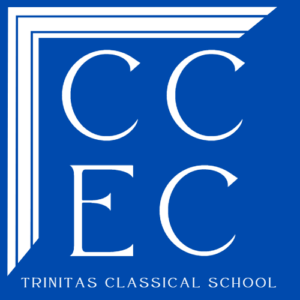 When we founded Trinitas Classical School in 2006, we considered various taglines for our marketing materials. Among them were, “the education you wish you had; the education your child can have” (a sentiment true for many of us) and “Trinitas—a school without walls” (a somewhat humorous attempt to cope with our struggle to find a facility). We chose to use “preparing students for lives well-lived,” and that has been our tagline for the last fifteen years. We’ve made a shift recently though in an attempt to avoid ambiguity about what we mean by “lives well-lived.” There are, after all, a myriad of visions of what a good or the good life is. Our new tagline makes explicit what we understand a well-lived life to be—we are “preparing students for lives of faith, reason, and virtue.” A brief explication of each of these seems like a good way to begin the new school year.
When we founded Trinitas Classical School in 2006, we considered various taglines for our marketing materials. Among them were, “the education you wish you had; the education your child can have” (a sentiment true for many of us) and “Trinitas—a school without walls” (a somewhat humorous attempt to cope with our struggle to find a facility). We chose to use “preparing students for lives well-lived,” and that has been our tagline for the last fifteen years. We’ve made a shift recently though in an attempt to avoid ambiguity about what we mean by “lives well-lived.” There are, after all, a myriad of visions of what a good or the good life is. Our new tagline makes explicit what we understand a well-lived life to be—we are “preparing students for lives of faith, reason, and virtue.” A brief explication of each of these seems like a good way to begin the new school year.
That “faith” appears first in our list is no accident. The Christian faith is both our starting point and our end; it is the foundation of our curricular, extra-curricular, and cultural choices, and it is a goal for which we believe each of us was made and toward which we strive. For an understanding of faith, we could perhaps do no better than Hebrews 11, a chapter our fifth-eighth graders memorize every other year. (We encourage you to read and discuss it this week with your family.) The author begins with a definition: “Now faith is the substance of things hoped for, the evidence of things not seen. For by it the elders [ancients] obtained a good testimony [were commended]. By faith we understand that the worlds were framed by the word of God, so that the things which are seen were not made of things which are visible.”
In these verses, we see a principle that is central to faith and to classical Christian education:
1.There is more to this world than what is seen.
The material world is not all there is. An additional mind-blowing truth is that the material world was created by God ex-nihilo, out of nothing. And, human beings, having been created in the image and likeness of God, are not mere material beings. These truths (or their denial) have a profound impact on education. (We’ll see this in our discussions of reason and virtue.)
The author of Hebrews goes on to provide one of the best known and greatest lists of heroes of the faith. He tells of Abel, Enoch, Noah, Abraham, Isaac, Jacob, Sarah, Joseph, Moses and his parents, Joshua, Rahab, Gideon, Barak, Samson, Jepthah, David, Samuel, and the prophets. He tells of their belief in God’s promises and faithfulness and miracles and gives testimony of their courageous acts of obedience.
In these passages, we see a second principle central to faith and to classical Christian education:
2.In order to understand and live by faith (or any virtue), we need inspirational examples.
What does faith look like? Look at Abraham—by faith, he “obeyed when he was called” and “went out, not knowing where he was going.” Look at Moses—by faith, “he refused to be called the son of Pharoah’s daughter, choosing rather to suffer affliction with the people of God than to enjoy the passing pleasures of sin.” Look at so and so, and do the same. An essential part of classical Christian education is providing students with inspirational examples of faith to inform their minds and mold their hearts.
Those of you reading The Divine Comedy with us will recognize the profound power of example from the second canto. Dante the pilgrim is “sunken in cowardice” for the journey he has agreed to take, but Virgil’s account of Beatrice’s faithfulness is sufficient to transform him: “As flowerlets drooped and puckered in the night turn up to the returning sun and spread their petals wide on his new warmth and light—just so my wilted spirits rose again and such a heat of zeal surged through my veins that I was born anew. Thus I began: ‘Blessed be that Lady of infinite pity, and blessed be thy taxed and courteous spirit that came so promptly on the word she gave thee. Thy words have moved my heart to its first purpose. My Guide! My Lord! My Master! Now lead on: one will shall serve the two of us in this.’ He turned when I had spoken, and at his back I entered on that hard and perilous track.”
Throughout the account in Hebrews, the author repeatedly points out that these heroes of the faith were looking for something better—they “waited for the city which has foundations, whose builder and maker is God”; they desired “a better, that is, a heavenly country.” And, he says, God will “be called their God, for He has prepared a city for them.”
Here we see a third principle of faith and of classical Christian education:
3.We are foreigners in this world for we belong to the City of God.
It may sound strange to say, but as students read history and classic literature and study salvation history and Latin and Greek and discuss “the ultimate questions”, they should become somewhat uncomfortable in the world. While a classical Christian education should give students confidence—they should graduate having learned much and also having learned well how to learn—their faith should also make them feel a bit like foreigners, and they should appear a bit like foreigners to others. But lest they despair of the condition of this world, they should know that their hope does not come from this world, it is secure in the perfection of Christ who “makes all things new.”
You have entrusted your children to us. We ask that you hold us accountable to the vision we articulate. And, we ask that you partner with us at home. Together, we can help build lives of faith by talking about the world that is unseen, providing examples of faithfulness, and seeking first the Kingdom of God.
© ALP
